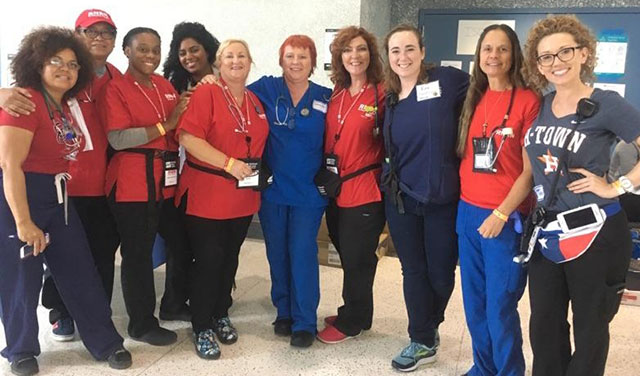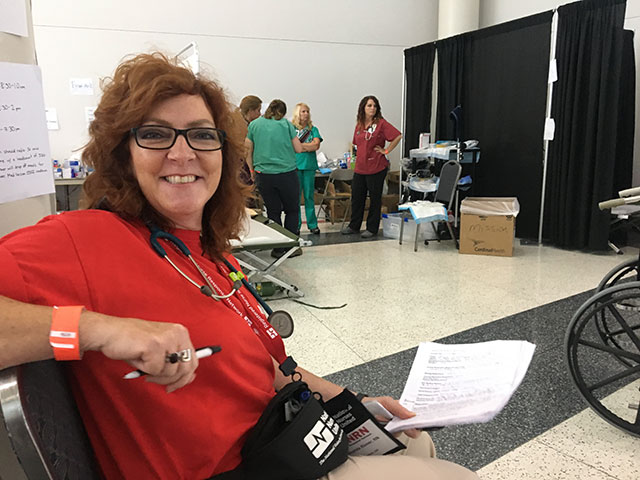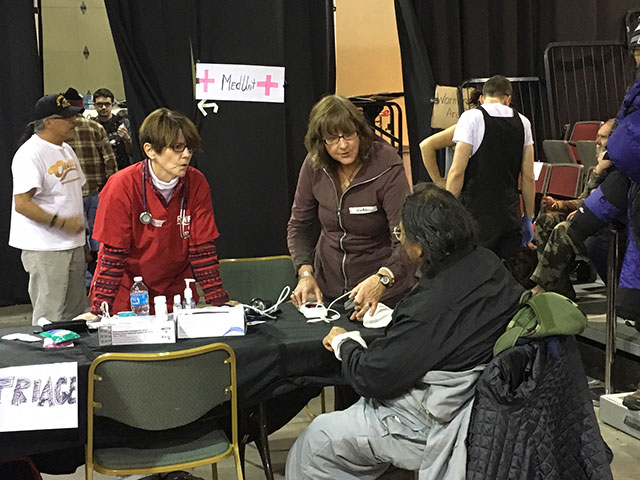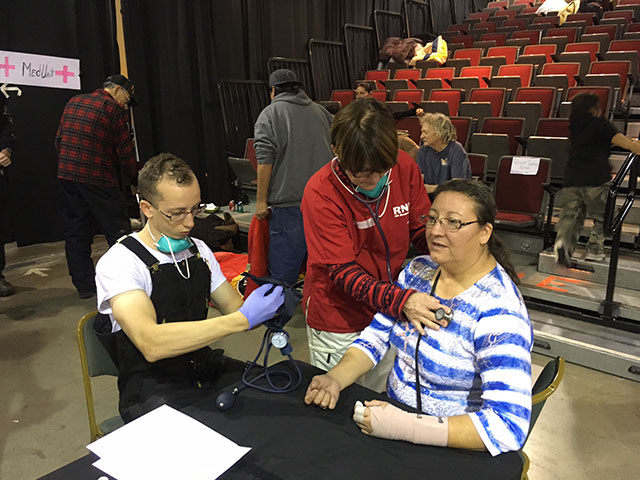
We’re now several months into the Trump administration, and activists have scored some important victories in those months. Yet there is always more to be done, and for many people, the question of where to focus and how to help remains. In this ongoing “Interviews for Resistance” series, we talk with organizers, agitators and educators not only about how to resist but also about how to build a better world. Today’s interview is the 76th in the series. Click here for the most recent interview before this one.
Today we bring you a conversation with Dotty Nygard and Rhonda Risner, two registered nurses, members of National Nurses United and activists for single-payer health care and climate justice.
Nygard is an emergency room nurse who works in Sutter Tracy Hospital in Tracy, California, and is a member of the Registered Nurse Response Network (RNRN). She is also a candidate for Congress from California’s 10th district. Risner worked in the private sector for 22 of her 28 years as a nurse and now works in the emergency department at the VA in Dayton, Ohio. Their work has taken them across the country and the world, where they’ve seen firsthand the effects of climate-worsened storms and the lack of consistent health care.
Sarah Jaffe: I understand both of you have been doing Hurricane Harvey relief as part of the RNRN Network?
Rhonda Risner: Yes, we have.
Start by telling us a little bit about what your experiences have been doing that.
Rhonda Risner: We went down for a one-week deployment. We were there on the third week after the disaster. We saw a lot of chronic issues. We saw a lot of acutely ill patients from heart attacks, strokes, hypertensive crises, people who had very high blood sugar; those were all probably a result of not having access to health care initially after the hurricane and also losing their medications in the floods thereafter.
I understand, too, that there are problems with the floodwater itself.
Dotty Nygard: We did not actually encounter it. We were two weeks after the fact, so a lot of the water has already receded. But what we have seen is a start of flu. This wasn’t just a little viral bug going around, it was actually confirmed flu. We saw that this was kind of an early start of the flu season. Because of the confined quarters and the large number or residents, we saw a small outbreak of flu, as well as some gastrointestinal issues. This is something that happens when you are in confined quarters and have a lot of different people with different immune systems present. It was very empowering to see that we had the resources available to treat people. It was a very combined group effort. A lot of great teamwork.
Rhonda Risner: There were lots of resources down there that were available. We worked in tandem with that. Norovirus was also being confirmed right as we were leaving, the danger of that is that it spreads quickly, especially in confined places. But we were able to recognize the symptoms, assess that pretty quickly and confine people and keep them separated from the general population. So, being able to recognize that quickly and being able to get them isolated was a really important thing. I think that is something that we are pretty proud of as nurses to be able to recognize those signs and symptoms and do what we needed to do very quickly and efficiently.
I imagine things like that can be a real problem if you have people staying in shelters and you have a lot of people in a small space.
Rhonda Risner: Yes, that was constant concern of everybody involved.
 Rhonda in the NRG Center in Houston. (Photo courtesy of National Nurses United)
Rhonda in the NRG Center in Houston. (Photo courtesy of National Nurses United)
Tell us a little background on the RNRN program.
Dotty Nygard: It is our volunteer network. It is nurses that actually do come in and sign up to volunteer with the national RNRN. It actually started after the South Asian tsunami. That was quite an impact and an initial relief effort that went over. From there, it has just grown. I think to date we have over 20,000 volunteer RNs that are actually powered by NNU [National Nurses United]. I think 2,000 are on standby and ready to go if there is a need. That is what we do as nurses; we go where there is a need, where people want us to help. That is what we can do best.
Rhonda Risner: We also responded to Haiti post-earthquake and also in the Philippines after their typhoon. We also work with the navy with Continuing Promise, which happens every two years. Thirty-plus NGOs work together with the United States Navy and we deploy on the USNS Comfort. I was actually able to deploy in 2015 on the South American six-month deployment. I did a two-week stint in Haiti just to follow up with a lot of the earthquake relief that started directly after the earthquake, as well. There was some follow-up care involved with that.
I have been saying to people for the last few weeks that it feels really apocalyptic right now because there is so much going on, but I imagine right now you have a lot of places that people are thinking of going to between more hurricanes and earthquakes and everything.
Rhonda Risner: We are ready to deploy. We are on standby and we are just waiting for the call. We are able to jump in where needed when asked. That is what we are waiting on at this point.
Dotty, also, you went to Standing Rock when the encampment was there. Can you tell us a little bit about that?
Dotty Nygard: I traveled up in December with a small deployment of nurses. It was actually the timeframe when we had the veterans also coming up to support. The experience was very emotional because it was incredibly… Just the encampment itself was this huge group of global activists from all over the world that came together to stand in solidarity with the Native tribes just trying to protect access to their water. It was this incredible educational time for me. It is beyond actually explaining. I grew so much from this experience because it just opened up my eyes to really, truly what is happening globally.
When you have such a force of people coming together to try and preserve and protect just one of your most basic natural resources, it speaks really loud and clear [to] what our world is facing right now. When you have corporations that come in to try and gain control over your well being, your land rights and your water access without any say… it was a game changer for me. Yes, I went up to help provide medical care, but, for me, it was just this incredible learning opportunity to really understand at a much deeper level what … [our world] faced with having these big corporations come in with so much power, and they can change your livelihood in just a blink of an eye.
The solidarity was amazing … we hit right when a blizzard came in. We did have to utilize quite a bit of our expertise. We saw a lot of frostbite and a lot of chronic illness, people that did not have access to their medications. Again, some of the basic chronic illnesses. Especially, with the Native Americans, their access to medical care is very fragmented and limited. We were able to help provide at least some kind of consistency for a time frame for a lot of people. It was a great time to be able to utilize nursing skill to assess the needs of the people that came to show support. We are all saddened with the outcome, but that is what solidarity is about, when voices speak up we can change things. There is still hope that there will be change with a lot of the outcomes down the road.
 Dotty caring for patients in the casino in Standing Rock, during the blizzard. Most people from camp evacuated to the casino during the blizzard. (Photo courtesy of National Nurses United)
Dotty caring for patients in the casino in Standing Rock, during the blizzard. Most people from camp evacuated to the casino during the blizzard. (Photo courtesy of National Nurses United)
 (Photo courtesy of National Nurses United)
(Photo courtesy of National Nurses United)
Rhonda Risner: The consistency of the care we provide, I think that is one of the things that they were really appreciative of in Houston, was that our team came in and gave consistency for one week with being able to supply resources there with the nurses to take care of the patients for that entire time we were there.
It is really something that we don’t talk enough about, that a lot of people don’t get consistent care for many reasons, not just because there is a hurricane.
Dotty Nygard: It plays on the fact that our health care system is broken and we have very fragmented care. We have many that can’t afford insurance. There are still millions of people that are not insured in this great nation of ours, and we have people that are insured but are afraid to use it because their co-pays and their deductibles are so high. It hinders those that do want to seek care and only perpetuates illnesses or whatever is ailing them at the time to become even more of a problem. We see people sicker in the ERs now. Preventative care is very minimal. It is not an emphasis. It is not a priority.
It speaks loudly of how we really have to fix the system first before we can really help our communities heal.
Rhonda Risner: I worked for 18 years in an inner city ER where we took care of patients who, absolutely, if they would have had preventative care for hypertension and heart diseases and diabetes, I wouldn’t have seen them a generation later in congestive heart failure and having amputated limbs from poorly controlled diabetes and heart attacks and strokes from uncontrolled cardiac disease. Prevention is the key. Our battle cry is that health care is a human right. That is why we really support Bernie Sanders Senate Bill 1804, which is our expanded Medicare for All. We think that everyone in this country deserves access to health care.
One of the things that I remember from the nurses that I spoke with after Hurricane Sandy here in New York was them saying that doing that direct care after the storm, they were providing better health care than a lot of people had ever gotten.
Rhonda Risner: Yes, we see that. We don’t need to wait for a disaster to happen to provide every person in this country with health care. We don’t have to wait for a disaster because health care is a disaster. We need to look at prevention and making sure that everybody has some sort of access to health care. We believe that everyone in this country deserves that.
 Dotty (wearing the peach scarf) and others with the Standing Rock deployment, out at camp, before the blizzard blew up. (Photo courtesy of National Nurses United)
Dotty (wearing the peach scarf) and others with the Standing Rock deployment, out at camp, before the blizzard blew up. (Photo courtesy of National Nurses United)
I want to switch gears a little bit and ask about the climate justice work you are doing, since we are talking about hurricanes and Standing Rock and all of these things and how this connects us to the work that you are doing as a union around climate change.
Dotty Nygard: We have brought a lot of awareness with marches and rallies to bring attention to the fact that climate crisis right now is all science-based. We see the evidence. We are a profession based on science. We see the tie-ins. We understand the data. We understand what is being presented and we need to come up with true concrete solutions that make differences, that can bring together a good plan to solve the problem, but it has to come together in total agreement. That is the resistance right now. I don’t think we have enough politicians that have the political will to step forward and say, “Yes, this is happening and, yes, we need to be more aggressive and assertive.”
I don’t think we have the time to wait. We have to be the ones that educate the public because we are seeing it right now: all these devastating hurricanes, there is a tie, there is a reason why they are happening. The ocean is warmer, our climate is changing, we are holding on to more CO2. We need to look at “What is the cause?” Until we get off of fossil fuels and get into more clean energy, we are just kind of pushing the can down the road. More disasters are going to happen. We are going to be deployed more at more devastating events. They can be prevented if we could just be more aggressive and be more assertive and do the right thing and change the direction of fossil fuel.
Rhonda Risner: I don’t think the average citizen really understands the correlation between all the ill effects that are going on directly with climate change and fracking and pipelines and pollution. I just don’t think they make that connection. I think that is a hindrance to what we are trying to do, as well.
Dotty Nygard: To raise awareness. Part of our profession, too, is to teach, to educate. It is bringing the science forward to show that this is truly happening.
I was thinking about one of the organizers that I know from the South Bronx who would always says, “We see the first line of climate change right here, which is our breathing because the air is polluted right away. Before you even see massive storms from climate change, you see the highest rates of asthma in the country.” I imagine you both have seen a lot of the immediate effects of our energy system.
Dotty Nygard: Yes, I live in the Central Valley. Yes, we have the highest incidence of children’s asthma. The air from the Bay Area gets blown in and trapped in the central Valley, and we have two large interstates that drive right up and down to the central Valley. We have a lot of pollution there. Yes, these are the effects. It actually affects our most vulnerable: our seniors and our children.
With that, I want to bring this back around to health care policy on a national level. The Republicans are trying to repeal the Affordable Care Act, again, but this past week we saw Bernie Sanders introduce a single-payer bill in the Senate that now has 17 Democratic co-sponsors. It kind of feels like we are in a “one step forward, two steps back” moment, but I would love to hear what you think as people who have been advocating for single-payer for a long time.
Rhonda Risner: It is exciting to see that there is more interest this time around. I think the power of our nursing unions has really educated the public and our legislators, and we are really putting pressure on them that they need to support this bill. There are lots of issues with the ACA, but certainly repealing and replacing isn’t the answer. We need to look at a system that actually works. We are not trying to just prop up what is already there, we are trying to have a solution to the problem, and we see Medicare for All as the solution. We can deliver care more efficiently and less expensively than the way that these insurance companies have done it for decades. It is time for them to move aside and let us push forward with the solution to the problem.
Rhonda, you are from Ohio. I know that one of your senators is considered a key swing vote on this. Do you know what people are doing to try to pressure him to not vote against even keeping the Affordable Care Act at this point?
Rhonda Risner: If you are talking about Rob Portman, it’s very, very difficult. We have put pressure on him from phone calls. We have made visits to his offices in Columbus, his satellite offices across the state. I have lobbied him directly in Washington, as well. I was very sad to see that he voted “yes” the last round. I don’t have a whole lot of hope.
I saw him in the airport last week, actually, when I was coming home from Houston, and I gave him my thoughts on the matter. I just think that we just need to put continued pressure on his office, making calls and writing letters and emails and lobbying them locally and nationally to support what the governor, for heaven’s sakes, of Ohio is even supporting. We did have Medicaid expansion in Ohio. So even the governor of Ohio wants him to do the right thing. It is just going to be grassroots efforts to put pressure on Portman to do the right thing for the constituents and citizens of Ohio.
I know you are at a convention right now, but are there any plans going forward for both defensive battles to try to save what people have, and then for more organizing around the single payer bill going forward?
Rhonda Risner: I just think that our number one priority is to push for the Senate Bill 1804, because we have said for years that Medicare for All is the way to go. That is going to be our battle cry.
Dotty Nygard: And it works. If you look at our senior citizens, you talk to any senior, they love their Medicare. They will tell you, “Don’t touch it.” It is a plan that works. All we are asking is just expand the lifetime from birth to death. It is something that we all deserve and it is the right thing to do.
Rhonda Risner: We just don’t believe that health care should be a profit-driven entity.
Dotty Nygard: A commodity.
Rhonda Risner: We see it as a basic human right. That is our priority: to care for our patients, to care for our communities, and care for Mother Earth, because she is pretty angry right now.
How can people keep up with both of you and get involved in the fight for single payer?
Rhonda Risner: They can go on our website: www.nationalnursesunited.org. There is lots of information on how to get involved there. Immediately, they can call their senators and their congresspeople and tell them to support Bernie Sanders’ Medicare for All bill, Senate Bill 1804. That is the most immediate thing we could do at this point. There are lots of ways to get involved, but there are resources on our website to direct you on how to do so.
Interviews for Resistance is a project of Sarah Jaffe, with assistance from Laura Feuillebois and support from the Nation Institute. It is also available as a podcast on iTunes. Not to be reprinted without permission.
Our most important fundraising appeal of the year
December is the most critical time of year for Truthout, because our nonprofit news is funded almost entirely by individual donations from readers like you. So before you navigate away, we ask that you take just a second to support Truthout with a tax-deductible donation.
This year is a little different. We are up against a far-reaching, wide-scale attack on press freedom coming from the Trump administration. 2025 was a year of frightening censorship, news industry corporate consolidation, and worsening financial conditions for progressive nonprofits across the board.
We can only resist Trump’s agenda by cultivating a strong base of support. The right-wing mediasphere is funded comfortably by billionaire owners and venture capitalist philanthropists. At Truthout, we have you.
We’ve set an ambitious target for our year-end campaign — a goal of $112,000 to keep up our fight against authoritarianism in 2026. Please take a meaningful action in this fight: make a one-time or monthly donation to Truthout before December 31. If you have the means, please dig deep.